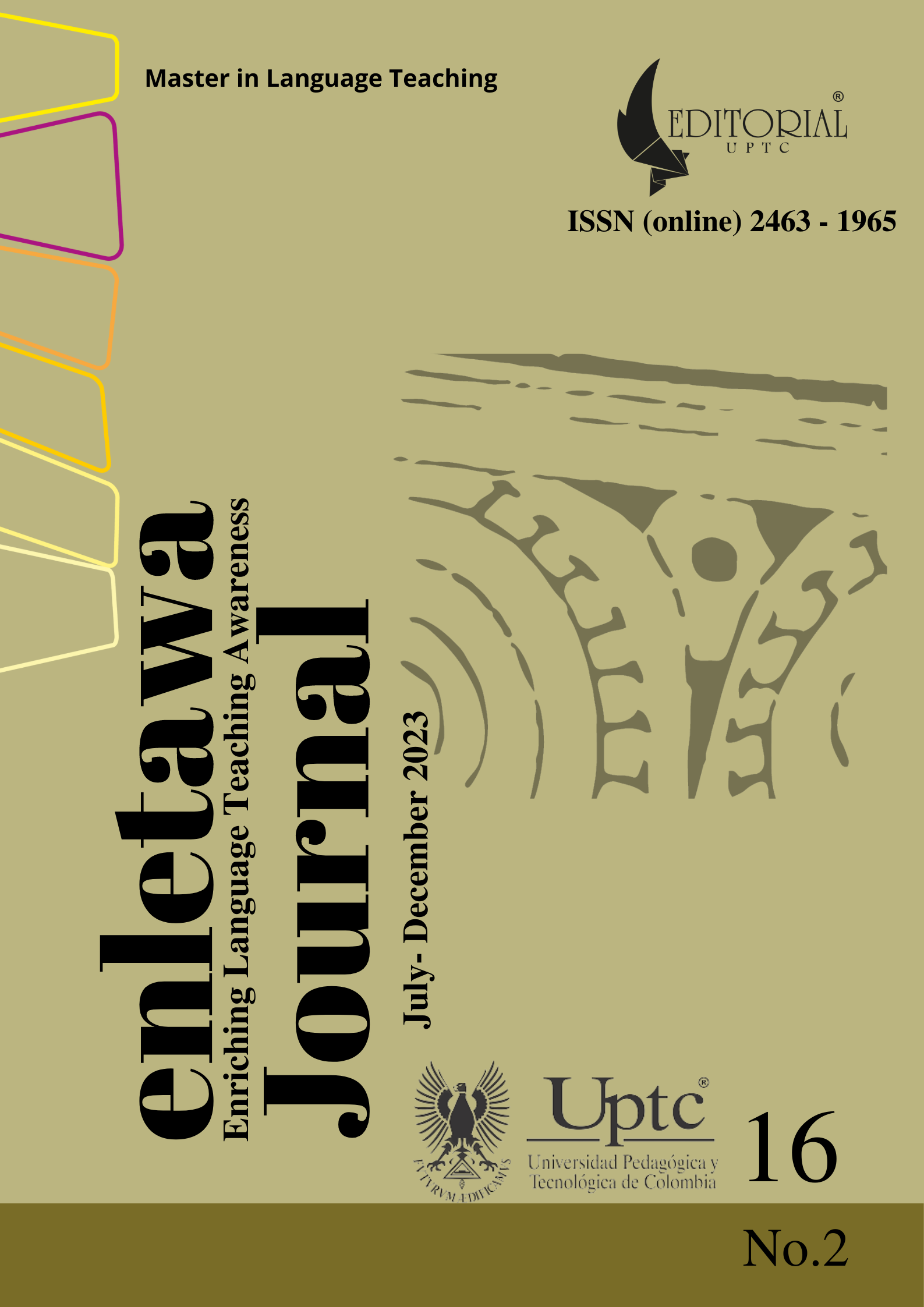Desarrollo profesional docente ILE. Indagación narrativa sobre planificación de clases durante la pandemia

Resumen
Esta investigación narrativa exploró las experiencias vividas por una maestra de ILE durante la pandemia y cómo éstas la ayudaron a reconstruir sus planes de clase como una manifestación de profesionalismo. Sus alumnos eran adultos con escolaridad inconclusa del currículo priorizado. Los datos se recopilaron a través de entrevistas, planes de clase, un diario reflexivo y capturas de pantalla de WhatsApp. Los resultados mostraron que sus clases se limitaban a mensajes breves de texto, voz y video. No existía retroalimentación individual o inmediata. La interacción dialógica durante la indagación narrativa fue una herramienta de mediación que activó las reflexiones de la profesora sobre sus lecciones pasadas, lo que la orientó realizar ajustes en sus prácticas pedagógicas presentes y futuras.
Palabras clave
actividades de práctica, capacitación docente, compromiso ético, currículo priorizado, objetivos de aprendizaje
Biografía del autor/a
Miriam Eucevia Troya Sánchez
Magíster en Pedagogía de los Idiomas Nacionales y Extranjeros mención Enseñanza de Inglés, Docente de Inglés en la Carrera de Pedagogía de los Idiomas Nacionales y Extranjeros de la Universidad Nacional de Loja, Ecuador
Carmen Delia Benítez Correa
Ph.D. en Filología Inglesa. Licenciada en Ciencias de la Educación: Planificación e Investigación Educativa. Licenciada en Enseñanza de Inglés como Lengua Extranjera. Profesora de la Universidad Técnica Particular de Loja. Coordina el grupo de investigación EFLTech de la UTPL. Ecuador
Citas
- Brown, H. D. (2018). Language assessment: Principles and classroom practices (3rd ed.). Pearson Education.
- Cardinal, T., Kim, M., Pegg, J., & Branch-Mueller, J. (2021). Being and becoming online teachers: A collaborative autobiographical narrative inquiry. Brock Education, 30, 30 -50. https://journals.library.brocku.ca/brocked DOI: https://doi.org/10.26522/brocked.v30i1.819
- Cerra, D. C. (2021). En tiempos de pandemia: La enseñanza de lenguas extranjeras en la educación remota. Revista Boletín Redipe, 10(8), 192 -212. https://revista.redipe.org/index.php/1/article/view/1399/1314 DOI: https://doi.org/10.36260/rbr.v10i8.1399
- Chizhik, E. W., & Williams Chizhik, A. W. (2018). Using Activity Theory to Examine How Teachers' Lesson Plans Meet Students' Learning Needs. The Teacher Educator, 53(1), 67-85. 10.1080/08878730.2017.1296913 DOI: https://doi.org/10.1080/08878730.2017.1296913
- Clandinin, J. D. (2019). Teacher education as narrative inquiry. In Journeys in Narrative Inquiry: The Selected Works of D. Jean Clandinin (1st ed., p. 12). Taylor & Francis Group. DOI: https://doi.org/10.4324/9780429273896-1
- Creswell, J. W., & Poth, C. N. (2018). Qualitative Inquiry and Research Design: Choosing Among Five Approaches (C. N. Poth, Ed.). SAGE Publications.
- Cuñado, A. G., & Abocejo, F. T. (2018). Lesson planning competency of English Major university sophomore students. European Journal of Education Studies, 5(8), 395 - 409. http://dx.doi.org/10.5281/zenodo.2538422
- Currículo Priorizado para la Emergencia. (2020). Ministerio de Educación. https://educacion.gob.ec/wp-content/uploads/downloads/2020/08/Curriculo-Priorizado-para-la-Emergencia-2020-2021.pdf
- Dewey, J. (1939). Logic. The theory of inquiry. Henry Holt and Company, Inc.
- Farrel, T. (2002). Lesson planning. In Methodology in language teaching (First ed., pp. 30-39). Cambridge University Press. DOI: https://doi.org/10.1017/CBO9780511667190.006
- Fathil, F. M., Ziden, A. A., & Osman, S. z. (2021). Lesson planning practices and lesson planning system design preferences among novice ESL teachers. Journal of Educational Research and Indigenous Studies, 3(1), 174 - 184. https://static.s123-cdn.com/uploads/1759562/normal_6065238305ffc.pdf.
- Gagné, R. M., Briggs, L. G., Briggs, L. J., & Wager, W. W. (1992). Principles of Instructional Design. Harcourt Brace Jovanovich College Publishers.
- Giles, A., & Yazan, B. (2020). You're not an island": A middle grades language arts teacher's changed perceptions in ESL and content teachers' collaboration. Rmle Online, 43(3), 1 - 15. https://doi.org/10.1080/19404476.2020.1724045 DOI: https://doi.org/10.1080/19404476.2020.1724045
- Gindin, E., Steenbergen, V., & Gleddie, D. L. (2021). Strangers No More: Collaborative inquiry through narrative as teacher reflective practice. Learning Landscapes, 14(1), 83 -95. https://doi.org/10.36510/learnland.v14i1.1044 DOI: https://doi.org/10.36510/learnland.v14i1.1044
- Golombek, P. R., & Johnson, K. E. (2017). Re-conceptualizing teachers' narrative inquiry as professional development. Profile, 19, 15 - 28. 15 PROFILE Vol. 19, No. 2, July-December 2017. ISSN 1657-0790 (printed) 2256-5760 (online). Bogotá, Colombia. Pages 15-28 http://dx.doi.org/10.15446/profile.v19n2.65692 DOI: https://doi.org/10.15446/profile.v19n2.65692
- Guskey, T. R. (2002). Professional development and teacher change. Teachers and Teaching: Theory and Practice,, 8(3). 10.1080/13540600210000051 2 DOI: https://doi.org/10.1080/135406002100000512
- Kadir, F. A., Balachandran, S., & Yunos, M. M. (2021). The impact of Covid-19 on English language teaching and learning Process: A review. International journal of Academic Research in Progressive Education and Development, 10(2), 300-30. http://dx.doi.org/10.6007/IJARPED/v10-i2/9741 DOI: https://doi.org/10.6007/IJARPED/v10-i2/9741
- Kumaravadivelu, B. (1994). The postmethod condition: (E)merging strategies for second/foreign language teaching. Tesol quarterly. https://doi.org/10.2307/3587197 DOI: https://doi.org/10.2307/3587197
- Mager, R. F. (1968). Developing attitude toward learning. Fearon Publishers. https://babel.hathitrust.org/cgi/pt?id=mdp.39015020958941&view=1up&seq=6
- MinEduc. (2017). Acuerdo Nro. Mineduc-Mineduc-2017-00040-A. https://educacion.gob.ec/curriculo-educacion-extraordinaria/
- Ministry of Education. (2012). Ecuadorian in-service English Teacher Standards. In Estándares de Calidad Educativa.
- Navarrete, Y., San Andrés, E., Bolívar, O., & Hernández, R. (2020). Las herramientas digitales como la principal alternativa en la Educación Superior Ecuatoriana en tiempos de pandemia. Estudios del Desarrollo Social: Cuba y América Latina, 8. Estudios del Desarrollo Social: Cuba y América Latina
- Richards, J. C., & Farrel, T. (2005). Development for teachers (1st ed.). Cambridge University Press.
- Sarasa, M. C. (2016). A Narrative Inquiry into Preservice English Teachers’ Imagined Identities. Gist Education and Learning Research Journal., 16, 96 - 114. DOI: https://doi.org/10.26817/16925777.246
- Sari, M. I. (2020). The narrative inquiry of a pre-service teacher in developing lesson plan with experienced teacher. English Ideas: Journal of English Language Education, 1, 55 - 67. https://journal.unsika.ac.id/index.php/IDEAS/article/view/4192
- Scrivener, J. (2011). Learning teaching. The essential guide to English language teaching (Third ed.). Macmillan Books for Teachers.
- Thomas, M. A. M., & Vavrus, F. K. (2021). The Pluto problem: Reflexivities of discomfort in teacher professional development. Critical Studies in Education, 62(4), 486-501. 10.1080/17508487.2019.1587782 DOI: https://doi.org/10.1080/17508487.2019.1587782
- Ubaque-Casallas, D. F., & Aguirre-Garzón, E. (2020). Re-Signifying teacher epistemologies through lesson planning: A study on language student teachers. Profile. Issues in Teachers' Professional Development, 22, 131 - 144. https://doi.org/10.15446/profile.v22n2.80687 DOI: https://doi.org/10.15446/profile.v22n2.80687
- Ubaque, D. F., & Pinilla, F. (2018). Exploring two EFL teachers’ narrative events regarding vocabulary teaching and learning. HOW, 25(2), 129 - 147. https://doi.org/10.19183/how.25.2.400 DOI: https://doi.org/10.19183/how.25.2.400
- UNICEF. (2020). Teachers: Leading in crisis, reimagining the future. UNICEF for every child. https://www.unicef.org/press-releases/teachers-leading-crisis-reimagining-future